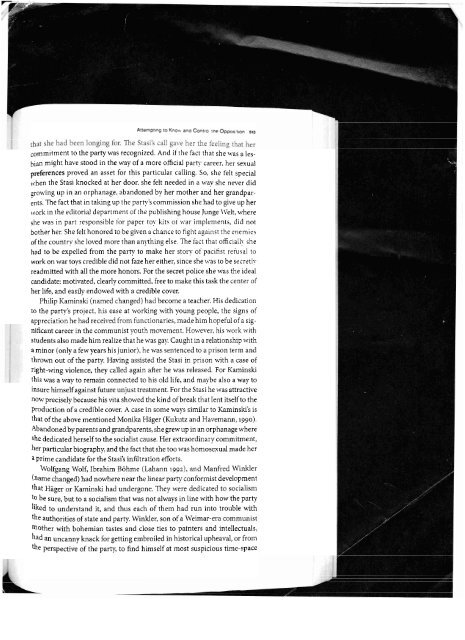C - Organized Mobbing
C - Organized Mobbing
C - Organized Mobbing
Create successful ePaper yourself
Turn your PDF publications into a flip-book with our unique Google optimized e-Paper software.
Attemptln~ to Kno~\ ana Contro Ine 0ppos tlon 513<br />
commitment to the party was recognized. And if the fact that she was a les-<br />
bian might have stood in the way of a more official parh career, her sexual<br />
proved an asset for this particular calling. So, she felt special<br />
!,.hen the Stasi knocked at her door. she felt needed in a wav she never did<br />
gro\z*ing up in an orphanage, abandoned by her mother and her grandpar-<br />
ents. The fact that in taking up the party's commission she had to give up her<br />
lvork in the editorial department of the publishing house Junge \\'elt, where<br />
she was in part responsible for paper toy kits or war implements, did not<br />
bother her. She felt honored to be given a chance to fight against ths enemies<br />
of the country she loved more than anything else. The fact that officiall!- she<br />
had to be expelled from the party to make her story of pacifist refusal to<br />
work on war toys credible did not faze her either, since she \\.as to be sscretly<br />
readmitted with all the more honors. For the secret police she was the ideal<br />
candidate: motivated, clearly committed, free to make this task the center of<br />
her life, and easily endowed with a credible cover.<br />
Philip Kaminski (named changed) had become a teacher. His dedication<br />
to the party's project, his ease at working with young people, the signs of<br />
appreciation he had received from functionaries, made him hopeful of a sig-<br />
nificant career in the communist youth movement. However, his work with<br />
students also made him realize that he was gay. Caught in a relationship with<br />
a minor (only a few years his junior), he was sentenced to a prison term and<br />
thrown out of the party. Having assisted the Stasi in prison with a case of<br />
right-wing violence, they called again after he was released. For Kaminski<br />
this was a way to remain connected to his old life, and maybe also a way to<br />
insure himself against future unjust treatment. For the Stasi he was attractive<br />
now precisely because his vita showed the kind of break that lent itself to the<br />
production of a credible cover. A case in some ways similar to Kaminski's is<br />
that of the above mentioned Monika Hager (Kukutz and Havemann, 1990).<br />
Abandoned by parents and grandparents, she grew up in an orphanage where<br />
she dedicated herself to the socialist cause. Her extraordinary commitment,<br />
her particular biography, and the fact that she too was homosexual made her<br />
a prime candidate for the StasiS infiltration efforts.<br />
Wolfgang Wolf, Ibrahim Bohme (Lahann i992), and Manfred Winkler<br />
(name changed) had nowhere near the linear party conformist development<br />
that Hiiger or Kaminsh had undergone. They were dedicated to socialism<br />
to be sure, but to a socialism that was not always in line with how the party<br />
liked to understand it, and thus each of them had run into trouble with<br />
the authorities of state and party. Winkler, son of a Weimar-era communist<br />
mother with bohemian tastes and close ties to painters and intellectuals,<br />
had an uncanny knack for getting embroiled in historical upheaval, or from<br />
the perspective of the party, to find himself at most suspicious time-space





